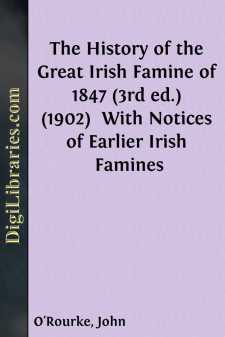History
- Africa 30
- Americas (North Central South West Indies) 50
- Ancient 68
- Asia 58
- Australia & New Zealand 8
- Canada 41
- Caribbean & West Indies 1
- Civilization 20
- Eastern Europe 12
- Europe
- Expeditions & Discoveries 60
- General 77
- Historical Geography 1
- Jewish 9
- Latin America 3
- Medieval 8
- Middle East 13
- Military 248
- Revolutionary 8
- Study & Teaching 5
- United States 353
- Western Europe 56
- World 13
Europe Books
Sort by:
by:
Walther Rathenau
THE NEW SOCIETY Is there any sign or criterion by which we can tell that a human society has been completely socialized? There is one and one only: it is when no one can have an income without working for it. That is the sign of Socialism; but it is not the goal. In itself it is not decisive. If every one had enough to live on, it would not matter for what he received money or goods, or even whether he...
more...
Sir Henry Sidney, in writing to his court, had always reported John O'Neil as "the only strong man in Ireland." Before his rout at Lough Swilly, he could commonly call into the field 4,000 foot and 1,000 horse; and his two years' revolt cost Elizabeth, in money, about 150,000 pounds sterling "over and above the cess laid on the country"—besides "3,500 of her...
more...
by:
Richard Twiss
ROAD FROM CALAIS. UNNECESSARY PASSPORTS. CHANTILLY. THE following excursion was undertaken for several reasons: the first of which was, that though I had been many times in Paris before, yet I had not once been there since the Revolution, and I was desirous of seeing how far a residence of a few years in France might be practicable and agreeable; secondly, a Counter-Revolution, or, at least, some...
more...
CHAPTER I COMMUNISTIC FARMING.—GROWTH OF THE MANOR.—EARLY PRICES.—THE ORGANIZATION AND AGRICULTURE OF THE MANOR When the early bands of English invaders came over to take Britain from its Celtic owners, it is almost certain that the soil was held by groups and not by individuals, and as this was the practice of the conquerors also they readily fell in with the system they found. These English,...
more...
by:
Jacob Abbott
Chapter I. 1600-1622Born in Scotland.King Charles the First was born in Scotland. It may perhaps surprise the reader that an English king should be born in Scotland. The explanation is this:The circumstance explained.They who have read the history of Mary Queen of Scots, will remember that it was the great end and aim of her life to unite the crowns of England and Scotland in her own family. Queen...
more...
by:
Anonymous
A DECLARATION OFTHE CAVSES, WHICH MOVEDthe chiefe Commaunders of the Nauie ofher most excellent Maiestie the Queene of England, in their voyage and expedition for Portingall, to take and arrest in the mouth of the riuer of Lisbone, certaine shippes of Corne, and other prouisions of warre bounde for the said Citie, prepared for the seruices of the King of Spaine, in the ports and Prouinces within and...
more...
by:
John O'Rourke
The great Irish Famine, which reached its height in 1847, was, in many of its features, the most striking and most deplorable known to history. The deaths resulting from it, and the emigration which it caused, were so vast, that, at one time, it seemed as if America and the grave were about to absorb the whole population of this country between them. The cause of the calamity was almost as wonderful as...
more...
by:
Lajos Kossuth
PREFACE TO KOSSUTH'S SPEECHES. Nothing appears in history similar to the enthusiasm roused by Kossuth in nations foreign to him, except perhaps the kindling for the First Crusade by the voice of Peter the Hermit. Then bishops, princes, and people alike understood the danger which overshadowed Europe from the Mohammedan powers; and by soundly directed, though fanatical instinct, all Christendom...
more...
by:
Anonymous
Prior. Mr. Dean, I am sorry to see you up, if any of your private Affairs disturb you. I came to call at your Grave, and have a little Discourse with you; but unless 'tis the Publick has rouz'd you, I am troubled to find you walking as well as my self. Swift. 'Tis my Country keeps me walking! why who can lie still? I don't believe there are many Ghosts now, that have any share of...
more...
by:
Grammaticus Saxo
LIFE OF SAXO. Of Saxo little is known but what he himself indicates, though much doubtful supposition has gathered round his name. That he was born a Dane his whole language implies; it is full of a glow of aggressive patriotism. He also often praises the Zealanders at the expense of other Danes, and Zealand as the centre of Denmark; but that is the whole contemporary evidence for the statement that he...
more...











